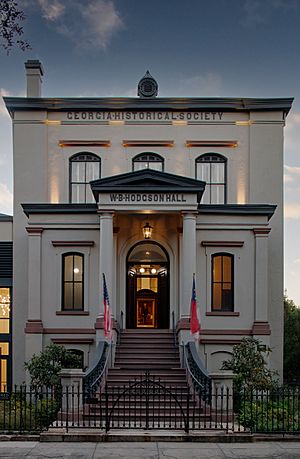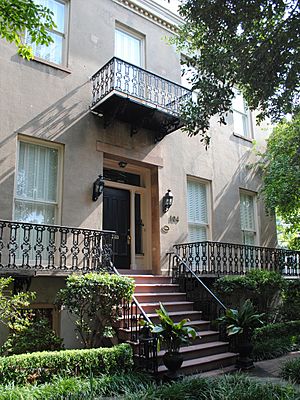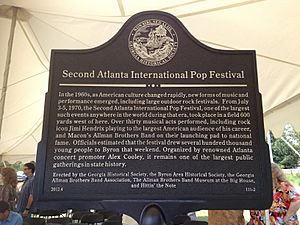Georgia Historical Society facts for kids
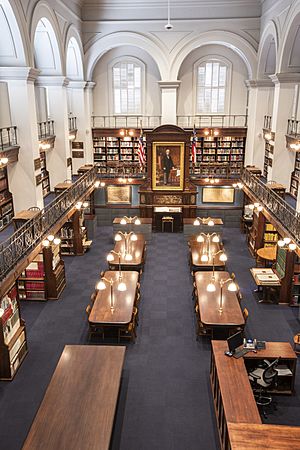
The Research Center's Reading Room, W. B. Hodgson Hall
|
|
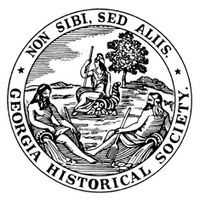
Seal of the Georgia Historical Society
|
|
| Formation | 1839 |
|---|---|
| Type | Independent Educational and Research Institution |
| Headquarters | Savannah, Georgia, U.S. |
| Location |
|
|
Membership
|
5,000 |
|
President and CEO
|
W. Todd Groce, Ph.D. |
The Georgia Historical Society (GHS) is a group that studies and teaches about the history of Georgia. It's located in Savannah, Georgia. The GHS is one of the oldest history groups in the United States. Since 1839, it has gathered, looked at, and shared Georgia's past. They do this through fun programs, books, and research.
Contents
- History of the Georgia Historical Society
- What the GHS Does
- GHS Buildings and Locations
- The GHS Research Center and Collections
- Today in Georgia History
- Georgia History Festival
- Georgia Trustees Award
- Georgia Historical Marker Program
- Vincent J. Dooley Distinguished Fellows Program
- Affiliate Chapter Program
- See also
History of the Georgia Historical Society
The Georgia Historical Society was started in 1839 in Savannah, Georgia. It is the oldest historical society in the Southern United States that has been open continuously. It is also one of the oldest history groups in the entire United States. Many important people helped start it. Some of the founders included John Macpherson Berrien and James Moore Wayne.
In 1849, the Society moved into a new building. This building was designed in the Gothic Revival style. It was on East Bryan Street. This original building was taken down in the early 1900s.
What the GHS Does
The Georgia Historical Society is an independent group. Its main job is to collect, study, and teach about Georgia's history. They work to make sure that the past is remembered and understood.
GHS Buildings and Locations
The main campus of the Georgia Historical Society is in Savannah. Savannah is the oldest city in Georgia. The campus has two main parts. One part is for research, and the other is for education. This shows how important both learning and studying history are to the GHS.
The Society's Research Center is in a building called W. B. Hodgson Hall. This building was made for the Society in 1876. It was named after William B. Hodgson, who was a diplomat and a curator for the Society for 25 years. Hodgson Hall has tall, arched ceilings and pretty iron decorations. It was designed by Detlef Lienau, a founder of the American Institute of Architects. The building is listed on the National Register of Historic Places. In 1970, the Abrahams Archival Annex was added. This part holds the Society's old documents and collections.
In 2011, the Society bought a historic building next door. This building became the Jepson House Education Center. It was built in 1856. It is named after Robert S. and Alice Jepson, who were generous people from Savannah. This center now holds the main offices for the Society's leaders and staff.
The Research Center was updated and expanded in 2021. This project added a new wing for archives. It also made new and improved spaces for organizing, digitizing, and storing historical items. The Society also has an office in Atlanta.
The GHS Research Center and Collections
The Georgia Historical Society is a major research center. It has a research library that is open to everyone. The library and archives hold the oldest collection of Georgia history materials in the country. This includes millions of old papers, thousands of photos, drawings, and rare books. There are also maps, portraits, and artifacts from all over Georgia and from every time period.
The GHS works with the Georgia State Archives. The State Archives collects official government records. The GHS collects private papers and materials from people, businesses, and groups. These are not government records.
Each year, many people use these materials. Scholars, teachers, students, and people tracing their family history come from all over the world. They use the collections to learn about the past. This helps them understand the present better. The library's collections are used for many things. People write history books, trace their family trees, and work to save old buildings. Students use them for projects, and teachers use them in classrooms. They are also used for making laws, legal decisions, documentaries, and news reports.
Today in Georgia History
"Today in Georgia History" is a series of short videos. Each video is about 90 seconds long. They focus on an event or person from Georgia's history that happened on a specific day. Dr. Stan Deaton and the Georgia Historical Society write and research these videos. They are produced and shown by Georgia Public Broadcasting.
Georgia History Festival
The Georgia History Festival is a special program for students from kindergarten to 12th grade. The Society puts on this program. It includes events over six months, usually during the school year. The festival celebrates and studies Georgia's history. It happens every year around February 12. This date is the anniversary of when the Georgia colony was founded in 1733. The festival includes a kickoff lecture, a Colonial Faire & Muster, Super Museum Sunday, the Georgia Day Parade, and the Trustees Gala.
Georgia Trustees Award
The Georgia Trustees is an award given by the Georgia Historical Society. They give it along with the governor of Georgia. This award honors people who have done great things and helped their communities. Their actions reflect the ideas of the original Trustees. These Trustees governed the Georgia colony from 1732 to 1752. New Trustees are honored each February at the Trustees Gala in Savannah. Many famous people have received this award. Some include Hank Aaron, Ted Turner, Vince Dooley, and Andrew Young.
Georgia Historical Marker Program
Since 1998, the Georgia Historical Society has managed the Georgia Historical Marker Program. They have put up almost 300 new historical markers across the state. These markers are black with silver letters and have the Society's seal on top. They cover many different topics.
The program works with local groups like community organizations, government groups, and churches. The Georgia General Assembly also helps by providing some money for new markers. Putting up new historical markers is a competitive process. Groups apply, and if approved, they share the cost of the marker with the Society. An independent committee reviews the applications once a year.
The GHS also helps take care of over 2,100 older markers. These were put up by the State of Georgia before 1998. They date back to the 1950s. These older markers are usually green and gold. They have the seal of the State of Georgia on top.
Vincent J. Dooley Distinguished Fellows Program
The Vincent J. Dooley Distinguished Fellows program honors Vince Dooley. He is recognized for his lifelong dedication to history and education. Coach Dooley was a longtime member and former chairman of the Georgia Historical Society's board. He strongly supported the Society's mission as a respected research and education group.
This program has two main goals. These goals match Coach Dooley's life and legacy. First, it recognizes important historians. Second, it helps new historians grow and develop.
People named as Dooley Distinguished Teaching Fellows are national leaders in history. They are writers and educators. Their research has helped people understand the past in new ways. These Fellows have also helped the Georgia Historical Society. They have taught in teacher training, given lectures, or worked as consultants. Being a Dooley Distinguished Fellow formally recognizes this important service.
The Dooley Distinguished Research Fellows Program helps the next generation of historians. It gives younger scholars a chance to do research. They can spend time studying the huge collection of original documents at the Georgia Historical Society Research Center. This research is expected to lead to important scholarly work. This could be a dissertation, a book, an article, or a paper for a conference.
The Vincent J. Dooley Distinguished Fellows Program connects Coach Dooley's name with excellent historical research and scholarship. This happens through the ongoing recognition of both Teaching and Research Fellows. The GHS Board of Curators created this program. It is supported by money given by friends and admirers of Vince Dooley.
Dooley Distinguished Teaching Fellows
Dooley Distinguished Teaching Fellows are national leaders in history. They are writers and educators. Their research has helped people understand the past in new ways. These Fellows have also helped the Georgia Historical Society. They have taught in teacher training, given lectures, or worked as consultants. Being a Dooley Distinguished Fellow formally recognizes this important service.
David W. Blight of Yale University was the first Teaching Fellow in 2018. He wrote "Frederick Douglass: Prophet of Freedom." Rick Atkinson, a Pulitzer Prize-winning author, was inducted in 2019. In 2022, Pulitzer Prize-winning author and historian Annette Gordon-Reed also became a Fellow.
Dooley Distinguished Research Fellows
The Dooley Distinguished Research Fellowships help scholars. They give them access to the GHS Research Center collections. This allows them to do deep research. These Fellowships support scholars from outside the Savannah area. They are for people doing graduate-level, post-doctoral, and independent research. Scholars apply for these Fellowships. They help cover costs while Research Fellows work at the GHS.
Research Fellows can use the GHS Research Collections. These include old papers, photos, architectural drawings, rare books, and thousands of maps, portraits, and artifacts.
Affiliate Chapter Program
The Georgia Historical Society's Affiliate Chapter Program is a network across the state. It helps local historical groups. The GHS offers workshops on how to care for historical records and items. They also visit groups to offer advice. They provide technical help, subscriptions to GHS publications, and publicity. They also give awards for great achievements.
This program started in 1996. It was part of a plan to help the Society serve the whole state better. The network includes almost 200 local historical groups. These groups are all over Georgia and even beyond. Any non-profit group that shares the GHS mission can join. Members include historical societies, museums, and preservation groups.
See also
- George Wymberley Jones De Renne, a former president of the Society
- Walter Charlton Hartridge Jr., a former president of the Society
- Leonard Mackall, a former president of the Society
- Mary Lane Morrison, a former curator of the Society
- Cerveau's Savannah, a book published by the Society in 1973
- List of historical societies in Georgia (U.S. state)
 | Laphonza Butler |
 | Daisy Bates |
 | Elizabeth Piper Ensley |


